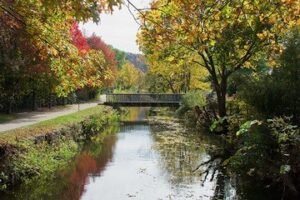
Canals Contain Political Message
By Seth Grossman
November is when many South Jersey residents leave the beach and take day trips to the north and west. Many walk the old towpaths of abandoned canals near Lambertville and Phillipsburg.
Few know the forgotten history of those canals or the political lessons they teach for today.
America’s first canal was the Erie Canal, built in upstate New York in 1825. It was a spectacular success. It brought cheap and reliable boat traffic between the entire East Coast and hundreds of cities and towns along the Great Lakes. It turned New York into the “Empire State” and New York City into the biggest and richest city in America.
Americans everywhere were eager to imitate the success of New York. That caused problems because New York then had the most corrupt and expensive state government in America. While occasional officials and employees can be dishonest anywhere, New York perfected a system of corruption.
Economics Professor John J. Wallis of the University of Maryland coined the term “systematic corruption” to describe it. That is where a handful of politicians control businesses and banks, and where a handful of business and bank owners control politicians. Politicians reward their favorite business owners with permits, tax breaks, loans, gifts of public land, and other favors not available to anyone else. They also make and selectively enforce complicated laws to snuff out competition.
In return, these bank and business owners give bribes, campaign donations, and political support to their favorite politicians.
Eventually, this “pay-to-play” corruption ruins an economy. However, New York got lucky. The Erie Canal brought in so much money that New York boomed.
During the 1820s and 1830s New Jersey and most other states rushed to imitate the success of New York. State and local governments borrowed heavily by selling bonds to their “favorite” banks. They built canals, toll roads, and bridges by awarding grossly padded and overpriced contracts to their favorite engineers and construction companies. Many were incompetent or outright frauds. Many projects were poorly planned, designed and built.
Most projects in America failed before they were finished. Sometimes the money disappeared before anything was built. New Jersey’s canals between Phillipsburg and Jersey City and between Bordentown and New Brunswick were finished. However, they never collected enough in tolls to pay back the construction loans.
In 1837, banks throughout America failed when the bonds they bought to finance this construction boom were not paid. Millions of Americans who put their life savings into these banks or invested in bonds lost everything. This caused other businesses to fail. Millions lost their farms and businesses. There was a seven-year economic collapse. Many thought American Democracy had failed.
However, America recovered. New Jersey was one of the first states to fix the problem. Professor Wallis said our solution “was as simple as it was ingenious.”
In 1844, New Jersey adopted a new State Constitution with these three reforms:
First, all laws had to be “uniform.” Politicians could no longer make “special” laws that treated some businesses better than others.
Second, state and local governments could no longer support or finance private businesses. There were to be no more “public-private partnerships.”
Third, state government could no longer borrow money unless voters approved–something New Jersey voters rarely did until recently.
These three reforms of 1844 quickly revived New Jersey’s economy. Government was simple, less expensive, and less corrupt because New Jersey politicians had fewer favors to sell. These three reforms were included in our revised NJ Constitution of 1947.
New Jersey government was virtually debt free until the 1960s. We had no state sales tax until the 3 percent sales tax designed to lower property taxes in 1963. We had no state income tax until our first 2 percent state income tax (also to lower property taxes) of 1976.
Today, New Jersey government is no longer like that. For the past 50 years, governors, legislators, and judges of both parties created countless loopholes that completely ruined the reforms of 1844. Today’s empty shopping malls, baseball stadiums, and the Revel Casino, are like the deserted canals of the 1830s. All we are missing is the economic collapse.
By the way, the canal that connects the Atlantic Ocean and Delaware Bay by Cape May was not built during the “Canal Fever” of the 1830s. It was built by the U.S. Army Corps of Engineers during World War II to protect coastal ships from German submarine attack. Today, it is used mostly by pleasure and fishing boats.
Seth Grossman is a Somers Point attorney and executive director of LibertyAndProsperity.org. The organization maintains a Liberty and Prosperity Facebook page. It meets for breakfast 9:30 am every Saturday at the Shore Diner in Egg Harbor Township by Parkway Exit 36. Seth Grossman can be reached at info@libertyandprosperity.org.





